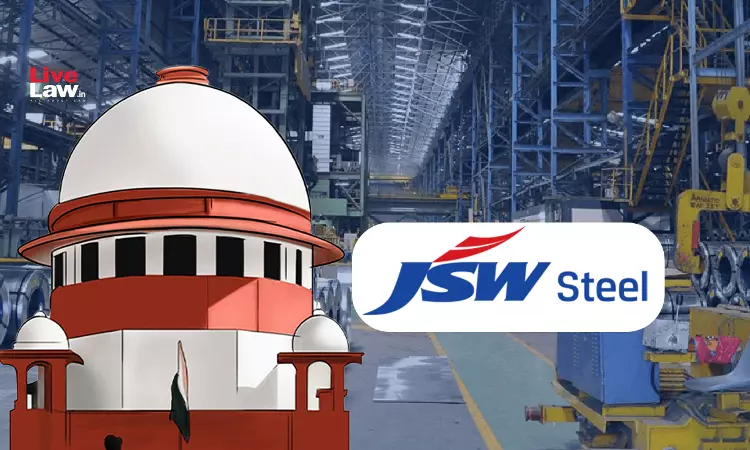The Supreme Court today (August 11) reserved its decision in the batch of appeals challenging the resolution plan of JSW Steel for Bhushan Power and Steel Ltd (BPSL).
The bench of CJI BR Gavai and Justices SC Sharma and K Vinod Chandran heard the matter. Previously, the bench, in exercise of review power, had recalled the May 2 judgment, which had rejected JSW’s resolution plan and decided to hear the matter afresh. In the May 2 judgment, the bench of Justices Bela Trivedi and SC Sharma set aside the resolution plan on 5 main grounds and directed the liquidation of BPSL.
Key Arguments Raised By Different Stakeholders During The Proceedings
Solicitor General Tushar Mehta, appearing for the CoC, submitted that a CoC constituted once under S.21 of IBC would continue to be in existence till the present bench decides the appeal.
” The end date ( of CoC) is till yourlordship decides this appeal but till then we exist, when we exist we have the power to exercise our commercial wisdom and S.14 of the General Clauses Act says that power to do something includes the power to do that periodically from time to time, as and when circumstances justify,” he added.
S. 14 of the General Clauses Act states “ —(1) Where, by any [Central Act] or Regulation made after the commencement of this Act, any power is conferred, then 3[unless a different intention appears] that power may be exercised from time to time as occasion requires.
(2) This section applies also to all [Central Acts] and Regulations made on or after the fourteenth day day of January, 1887.”
SG stressed that the CoC continues to function due to a joint reading of S. 23 and S.28 of the IBC.
S. 23 (1) proviso states that the Resolution Professional will continue managing the company (corporate debtor) even after the insolvency process period ends, until the court approves a resolution plan or appoints a liquidator.
The Provision states : Subject to section 27, the resolution professional shall conduct the entire corporate insolvency resolution process and manage the operations of the corporate debtor during the corporate insolvency resolution process period.
[Provided that the resolution professional shall continue to manage the operations of the corporate debtor after the expiry of the corporate insolvency resolution process period, until an order approving the resolution plan under sub-section (1) of section 31 or appointing a liquidator under section 34 is passed by the Adjudicating Authority.]
Now S. 28 states that during the insolvency process, the resolution professional cannot take certain major actions like raising large loans, changing company ownership or capital structure, or altering management, without prior approval from the CoC. Such approval requires a 66% majority vote in the committee. If the resolution professional acts without this approval, the action will be void and may lead to action against them by the Board.
He added that CIRP (corporate insolvency resolution process) was defined under Regulation 2 (e), which means, “the insolvency resolution process for corporate persons under Chapter II of Part II of the Code”. Under Chapter 2, appeals against the order approving a resolution plan are covered under S.32.
Thus, as long as the present appeal is pending, the RP continues to function, and the CoC will also exist as RP’s functions were determined by the approval of the CoC.
The SG also stated that only because of the CoC, BPSL somehow managed to keep it afloat.
Sr Advocate Dhruv Mehta, appearing for the erstwhile promoters of BPSL, mainly contended that JSW had faltered in executing the plan as promised. Mehta submitted that the promoters wanted the Insolvency process to happen afresh and did not favour the liquidation of BPSL. He stressed that once a plan is approved by the Adjudicating Authority, the CoC ceased to exists and does not have the power to revisit or modify it.
Sr Advocate NK Kaul for JSW Steel submitted (1) there was no delay on the part of the SRA as far as the implementation of the plan is concerned; (2) despite NCLAT’s order setting aside the provisional attachment of properties, ED was persistent in prolonging the issue by filing criminal cases.
He stressed that only after the Supreme Court’s order in December 2024, the promoter’s assets were directed to be instituted with the SRA (JSW Steel). He added that during those proceedings, CoC on affidavit submitted that because of the cases filed ED, the implementation of the plans has been delayed.
Kaul also submitted that the ex-promoters do not have a locus in having a say in the plan. He also informed the Court that the present resolution plan is the second biggest plan proposed in the history of IBC in this country after the case of CoC of Essar Steel India Limited through Authorised Signatory v. Satish Kumar Gupta and Ors. In the Essar Steel case, the Resolution Plan involved 42,000 crores as upfront payment and an equity infusion of Rs 8000 crores.
Background
On May 2, the Supreme Court rejected JSW Steel’s ₹19,700 crore resolution plan for Bhushan Power and Steel Ltd (BPSL), holding it to be in violation of Sections 30(2) and 31(2) of the Insolvency and Bankruptcy Code. A bench of Justice Bela M Trivedi (since retired) and Justice Satish Chandra Sharma directed the liquidation of BPSL, setting aside earlier approvals granted by the NCLT and NCLAT.
The Court found that the Resolution Professional failed to discharge duties under the IBC and the CIRP Regulations, and the Committee of Creditors (CoC) did not exercise proper commercial wisdom and failed to protect creditor interests. Further, the bench observed that JSW had wilfully not complied with the terms of the resolution plan for two years after its approval, though there were no legal impediments. The Court also held that JSW had made misrepresentations before the CoC and abused the process.
The Court held that the CoC ought not to have accepted the plan. The Court also criticised the NCLT and NCLAT for approving the plan and set aside their orders dated September 5, 2019, and February 17, 2022. Invoking Section 33(1) of the IBC read with Article 142 of the Constitution, the Court directed the initiation of liquidation proceedings against BPSL
On May 26, a bench of Justice BV Nagarathna and Justice Satish Chandra Sharma ordered status quo on liquidation proceedings before the NCLT, after JSW Steel indicated its intent to file a review petition, in order to avoid complications while the limitation period for filing review remained open. Following this, JSW, Punjab National Bank, and other creditors moved review petitions.
Subsequently, on July 29, a bench of Chief Justice of India BR Gavai and Justice Satish Chandra Sharma accepted JSW’s request for an open court hearing of the review petition.
Case no. – KALYANI TRANSCO Vs MS BHUSHAN POWER AND STEEL LTD.| C.A. No. 1808/2020 and connected matters





